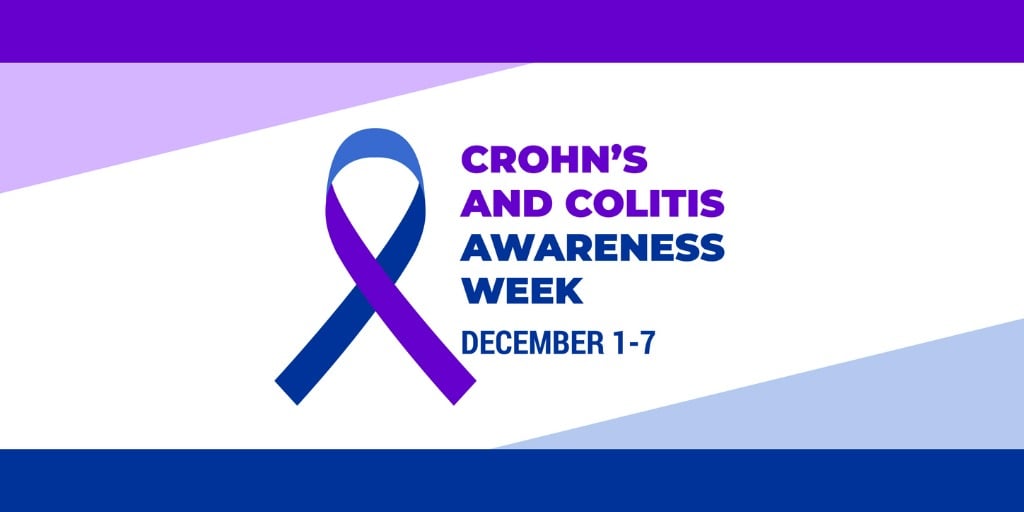Crohn's Disease or Colitis symptoms? Check out these strategies.
Although December is designated as Inflammatory Bowel Disease (IBD) Awareness month—with December 1st through the 7th as Crohn's and Colitis Awareness week—those who have these conditions know that management is a year-round and sometimes full-time endeavor. Characterized by chronic inflammation of the digestive tract, these diseases can lead to symptoms like abdominal pain and cramping, severe fatigue, diarrhea, anemia, and malnutrition.
That's why nutrition is a crucial component of treatment, and it's likely that if you have one of these conditions, you're already working with your health team on a dietary plan that helps reduce trigger foods and minimizes symptom flare-ups. This is often a complementary approach to medications that can reduce inflammation overall, helping the digestive tract to heal.
Although, those aren't the only options when it comes to tamping down symptoms. Here are four approaches that research suggests can be helpful for those with Crohn's Disease and Colitis, as well as irritable bowel syndrome—a condition that's not tied to an immune response, but instead is a disruption in the way the gut and brain are communicating.
1.Stress reduction
Psychological stress doesn't cause IBD, but it can be a major contributor to symptoms. Research in Frontiers in Pediatrics found that for both children and adults, stress acts as a trigger for relapses because it disturbs beneficial gut bacteria and reduces the efficiency of the immune system. Implementing stress-reduction strategies can be a meaningful way to protect your gut and boost your immunity.
Not sure how to start? Begin with your breath. A research review in the journal Frontiers in Human Neuroscience suggests breathwork can have a significant effect on your autonomic and central nervous systems, as well as your psychological status. Those researchers noted that slow breathing can increase feelings of relaxation while also making you more alert, and this type of exercise is particularly powerful when you're feeling stressed, angry, or anxious.
Here's an easy exercise to kick off the effort: Inhale for a count of four, hold your breath for four more counts, then exhale for a count of six. Do this five times. Or simply take a few deep breaths and make your exhalations longer than your inhalations—which sends a signal to your nervous system to relax.
2. Quality sleep
Getting rest and restorative sleep is hugely important for your whole body and brain, and it's particularly crucial for your digestive system. Commentary in the journal Gastroenterology & Hepatology notes that sleep and IBD is bidirectional, which means that if you improve one, it will benefit the other.
The Crohn's & Colitis Foundation highlights one particular treatment option called Cognitive Behavioral Therapy for Insomnia, or CBT-I. This involves four to eight visits with a sleep psychologist who can provide guided direction for the treatment of issues like difficulty falling asleep, daytime fatigue, and sleep disruption. Whether you choose to try CBT-I or not, it's helpful to talk with your healthcare provider about any sleep disruptions, since solving those issues can be a major way to reduce IBD symptoms.
3.Daily movement
Another way to decrease stress and improve sleep is exercise, which is often recommended for people with IBD. Research in the Canadian Journal of Gastroenterology notes that exercise may decrease Crohn's Disease symptoms. Although some research suggests high-intensity exercise could be problematic for people with Crohn's and Colitis, sticking to moderate exercise that includes resistance training could decrease disease activity.
That said, if you absolutely hate structured exercise, here's good news: You don't have to grit your teeth and endure it for the sake of symptom relief. Research suggests simply being more active in ways that are enjoyable for you can go a long way toward reaching your exercise goals.
That might mean more walks, gardening, playing with your kids or grandkids, doing yard work for an elderly neighbor, dancing around the house, or doing gentle stretches if you've been sitting for a few hours. All types of movement add up, and that's been shown to promote good gut health.
4.Connect with others
Ample research suggests that feeling isolated or lonely can have profound health effects, and raise your risk of issues like cardiovascular disease and depression. For those with IBD, especially during symptom flare-ups, it's often easier to stay home and close to a bathroom, just in case. But even then, that doesn't mean you can't stay connected with others.
Online social networks can be a lifeline, and it also helps to talk with others who are facing the same challenges. Check out sites like MyCrohnsandColitisTeam, which has over 160,000 members with IBD and notes that you can share daily ups and downs in a judgment-free virtual space.
Putting lifestyle changes like these into place can build a better foundation for your health, and may lead to fewer flares over time.
For more health and wellness education from Mass General Brigham Health Plan, follow us on social @MGBHealthPlan




